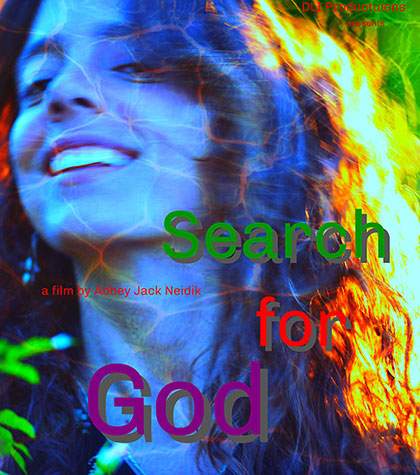Search for God
The Kabbalistic Aspects of Documentary Filmmaking
In a dramatic film the director is God. In a documentary, God is the director.
— Alfred Hitchcock
Featuring a host of wildly eccentric, charismatic, and insightful characters, Search for God illuminates the art of documentary filmmaking and the quest for the meaning of life. Taking us to the brink between illusion and reality, the film brings into sharp focus the morality and responsibilities of filmmaking.
Richard Gilbert, film critic and blogger for New Eyes and Voices magazine, wrote the following review of Search for God: The Cabalistic Aspects of Documentary Filmmaking.
Supposedly, Search for God is a documentary about people on a spiritual journey, people who are searching for some meaning in their lives. But how much credibility can one grant the movie when the filmmaker is obsessed with a beautiful young woman, convinces her to take part in his project, then, in a truly sleazy fashion, incorporates their relationship into this dubious, though titillating, project. The filmmaker claims she is his soul mate, but it’s obvious he couldn’t care less about her thoughts about spirituality. It appears to me the only thing that interests him are two obsessions—his precious film and his girlfriend’s magnificent and mesmerizing beau p’tit cul (pretty little ass as they in Montreal, where much of the film occurs although we are also subjected to random scenes in New York City, Los Angeles, and the Mojave Desert).
The style of the documentary is almost impossible to describe. We never see the main character, the filmmaker. Everyone talks to camera, as if the film was a state-of-mind. Some scenes seem to be in the present; then later we find out they are flashbacks. We feel like we are in an Escher drawing. Are we on the ground floor or standing on the roof? What is reality?
Search for God is certainly populated with an assortment of unusual characters:
— Bea, a former newspaper writer, who is convinced she was abused as a child by her father and the clergy and who claims to be able to speak to the dead, including Saint Brother André, the miracle worker who inspired the building of Montreal’s St. Joseph’s Oratory.
— Yvon, a former heroin addict, who was in the act of drowning himself when he heard Jesus telling him that he still had work to do on Earth. Now, Yvon believes the spirit of Paul de Chomedey de Maisonneuve, founder of Montreal, is guiding him to create a new accord with the Mohawks and Algonquians in order to protect Mother Earth.
— the lovely Annick, a backup singer who lived with a shaman in a cave in Brazil, until she became a born-again Christian. In the film she dreams of a tattoo and meets a man with the design on his chest. Is this a sign from God that she should marry him?
We are also introduced to an array of porn stars, tattoo artists and people suffering with mental illness. The filmmaker asks whether they believe in God and what Life is all about.
The only thing missing in Search for God is normal people like you and me. You would think the average, hard-working ordinary person might have something to say about the purpose of life. Obviously, the filmmaker does not. There is nothing ordinary in this film.
“Our God is a creative God,” the filmmaker cites from the Talmud in an attempt to make an analogy between the art of documentary filmmaking and the spiritual seeker’s search for God. All creation comes out of chaos, he says. But to this reviewer he is simply trying to justify his own confusion about what to do with the endless miles of footage he’s shot. Throughout the film, he offers his insights into the filmmaking process, as if giving a secret cabalistic course that only he and a few selected others know about.
Despite all this, the film is well worth seeing; sometimes even brilliant, not so much because it gives a real insight into the nature of God, but because it does portray how lost our world is (especially the filmmaker’s world) and how resilient people are. If there is one thing that unites all the films’ unusual characters and who we come to sympathize with, is that they have all been damaged by love in one form or another like the majority of us. Yet despite the pain these characters have endured, their message = is not to embrace less love, but even more and more love — infinite love. Thus the Search for God.
Of course, at the heart of the film is the wonderful Lisa, the filmmaker’s girlfriend. She alone is worth the price of admission. Its hard not to fall in love with her infectious smile, quirky humour and amazingly good looks. I just wonder how she ever ended up falling in love with this self-centered jerk of a director who thinks and acts as if he’s God.
— Richard Gilbert
Added note: If anyone out there knows Lisa’s email or phone number could you forward it to me. I’d like to interview her for a magazine article I’m doing. In the meantime see you at the movies.
Comments to the review (5):
—–Its quite apparent that Mr. Gilbert has no understanding of the spiritual quest, and lives totally in a materialistic world, where the purpose of life is to get as many stars as possible next to my film someone’s film. JumpingGeronimo
—– I’d like to meet this Lisa with the big ass. I’m sure she could teach me something about doing it for God. GoLeafsGo
—–I wish Richard Gilbert would finally get laid and save us from another of his uptight reviews. RingoStarr2
—–I’m planning to see the film. Who wants to come with me? Martha@Lipsforyou.com
—–Best documentary ever! Five Stars!!!!! Martin Nault, editor Search for God
Audience Reactions:
The portrait of a madman.
The truth about God is finally revealed!!
The filmmaker ventures into mystical areas that even Kabbalah masters fear to go.
Search for God proves we don’t exist!!
I lost my faith after seeing the film.
I’m now convinced God is hiding incognito somewhere in the world.
WARNING: WHEN LEAVING THE THEATRE, YOU MAY FEEL YOUR LIFE IS MEANINGLESS AND THE OUTSIDE WORLD DOES NOT EXIST.









Great meeting you at the Bel Air Hotel. Hope to see you again.